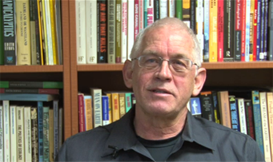March 24 marks 25 years since the Exxon Valdez oil spill off the coast of Alaska, and researchers say the mishap has had a huge impact on the nearby town of Cordova. Dr. Duane Gill, sociology department head at Oklahoma State University and a leading researcher and expert on the effects of the disaster, recently concluded nearly a quarter century of work focused on the small commercial fishing community.
 “They have had a lot of pretty dramatic social, cultural, and economic effects in the community over the years,” said Gill in discussing the research, which was sponsored by the National Science Foundation.
“They have had a lot of pretty dramatic social, cultural, and economic effects in the community over the years,” said Gill in discussing the research, which was sponsored by the National Science Foundation.Gill, J. Steven Picou (University of South Alabama), and Liesel Ritchie (University of Colorado) originally focused on the impacts of the spill itself. However, it became apparent the effects of a 19-year litigation process, which was eventually resolved by the U.S. Supreme Court in 2008, also had significant impact on the community.
In addition to the immediately obvious economic impact on Cordova, Gill and his team found social and psychological consequences stemming from both the technological disaster of the oil spill and the protracted battle fought in the court system. Years of observation, in-person, and telephone interviews throughout the recovery process gave the team a thorough and unique look at an entire community’s effort to adapt.
“You have disruptions in social relationships, disruptions in the community in terms of families struggling to make their payments,” Gill said. “We saw lots of mental health issues and increases in dysfunctional behaviors.”
With nearly a quarter of a century of research to draw upon, Gill, Picou, and Ritchie have collected an unprecedented amount of comprehensive data covering economic, sociocultural, and psychosocial fallouts from the Exxon Valdez spill. Such extensive long-term research continues to impact efforts to assess and project consequences of more recent technological disasters, such as the BP Gulf Coast disaster in 2010.
“It is harder to identify with technological disasters where the damage may be invisible unless you are tuned into to it, so you have a different definition of what’s going on between a technological and natural disaster,” Gill said. “That adds to the psychological stress. You don’t get the kind of empathy you typically do with a natural disaster.”
Gill is a past president of the Mid-South Sociological Association and has served on the Minerals Management Service Outer Continental Shelf Scientific Committee and the Gulf of Mexico Fisheries Management Council’s Socioeconomic Panel. He is also a Fulbright Scholar, having spent the 1998-99 academic year at the University of Bahrain.
Want to help more great students and faculty like this? Click here.
